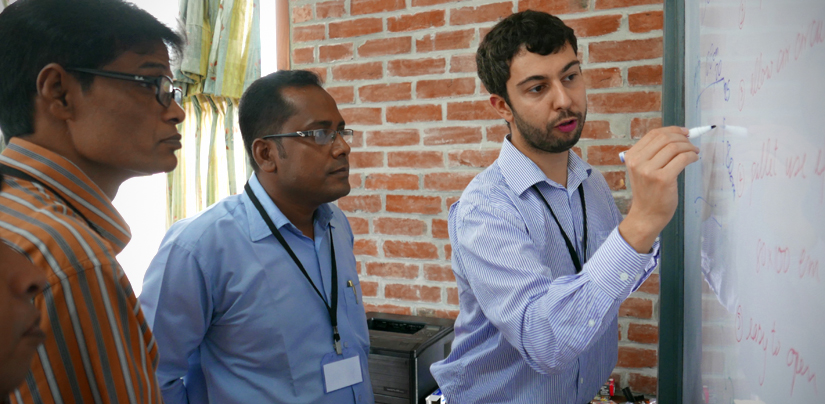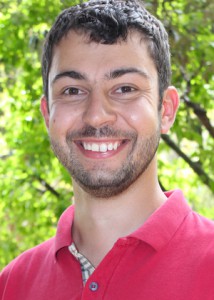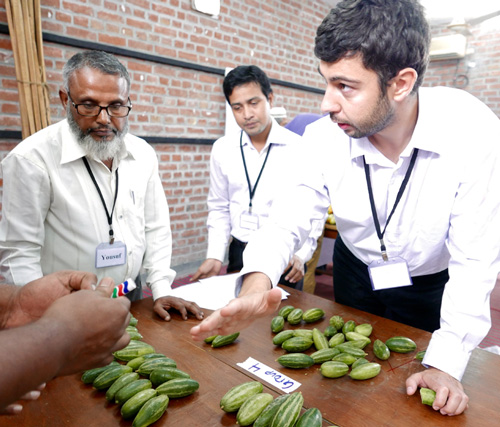
Editor’s note: In 2015, Angelos Deltsidis joined the Horticulture Innovation Lab team at UC Davis as our new international postharvest specialist. Now that he has had six months to begin working on projects, we thought it might be nice to officially introduce him to you and give you an idea of what his role will be at the Horticulture Innovation Lab.
Question: Tell us about your background and how you ended up at the Horticulture Innovation Lab.

Angelos Deltsidis: I studied horticulture in Greece at the University of Thessaly as an undergraduate. I’m from an agricultural region in northeastern Greece called Thrace, but my family is not directly related to farming per se. My grandparents had a family farm, but we would just visit for fun and grow some potatoes or tomatoes for us to eat.
In my second year of undergraduate studies, I was an exchange student at the University of Florida and worked with Dr. Jeff Brecht.
Fun fact: Dr. Brecht and my advisor at Thessaly, George Nanos, were both students of Adel Kader at UC Davis. They weren’t here at the same time as each other, but they kind of knew each other just because they were both students of Kader.
In 2009, I moved to Florida and began working toward a doctoral degree in horticulture. I also started taking classes for a master’s degree in agribusiness from the Department of Food and Resource Economics. I wanted to get some business insights, to see how it interacts with horticulture and how I can apply what I’m learning in horticulture with a business perspective. In horticulture, I focused on postharvest physiology of fruit. My main project for five years was about how low-temperature storage can affect the aroma profiles of tomatoes. I completed my degree requirements in May and officially graduated from the University of Florida with my Ph.D. in August 2015.
Why focus on postharvest?
The first time I remember thinking about postharvest practices was when I was traveling in Egypt with my family during high school. I remember seeing tons of mangoes under the sun just rotting on the side of the road, and I remember thinking “That’s wrong. Why don’t they put them in the fridge?” I was young, and I didn’t understand local conditions. Then when I went back to Greece and traveled in Europe, I saw that we also waste a lot. Even in countries with steady electricity and refrigeration, there is food waste that should be reduced.
This was what led me to think about the field of postharvest. When I worked with Dr. Brecht on a small project in Florida, I really liked what I was doing. So I decided to continue.
I like the fact that in postharvest, you don’t need to work on producing more crops in order to feed the rising population of this world. You work on preserving what you get, storing it, maintaining its quality and finding how you can actually use it instead of wasting it.
What have you done so far, with the Horticulture Innovation Lab? What are you working on now?
In my first month here, I helped organize a short course on postharvest practices in Bangladesh with Britta Hansen and Michael Reid. I taught several classes there on postharvest physiology, tomato, pepper, cucumber, gourd, eggplant, and other crops.
I also traveled to Tanzania to install a CoolBot and air conditioner in a remodeled cold room at HORTI-Tengeru, and I will go to Bangladesh in January to install another CoolBot. I am also working with Michael Reidon testing some new technologies.
From here, I have been supporting some of the other Horticulture Innovation Lab projects. I am consulting with Manny Reyes and his team in Cambodia on good postharvest practices for several different vegetable crops — how to harvest, how to handle, how to ship, how to store. There is a perception in Cambodia that when something has been cooled down, it is old and not fresh. So they are trying to craft the message that handling vegetables correctly does not mean the vegetables are old.
I am also analyzing data results from one of the completed research projects on postharvest technologies in different climates. I am trying to see whether we can draw conclusions based on how the different climates might have affected the efficacy of the technologies. This way we can focus better on putting our resources in areas where it would make more sense.
Also, part of my time (25%) is working with the UC Davis Postharvest Technology Center, updating publications and assisting with training courses.
What do you hope people will learn from you about postharvest?
In postharvest, little things can make a big difference. Using the right temperature when storing the product, packing it right, cushioning it during transportation, not mixing loads that would create issues with ethylene or odors or temperatures: These are little things that don’t cost very much to change, but their impact on the quality of the product is impressive.
Any surprises with your job so far?
I found that we take many things for granted, as I said earlier. When traveling, you have to adapt to the local conditions, otherwise it won’t work. Before you go, you think it will take you a day to do something, but it takes you a week or two. When I went to Tanzania, the electricity was not good while I was there. So we used generators. In Bangladesh, I had to wake up at 2 a.m. just to check my email because the Internet connection was overloaded.

When we went to Bangladesh, my UC Davis colleagues had to leave urgently because of bad weather and other travel plans, so they left me to finish leading the short course by myself. So I taught an entire day, wrapped up the 10-day course, and handed out certificates in a closing ceremony. Somebody had to do it. But that means that just two weeks after joining the office, I was not just working here in the office — I was representing the university in Bangladesh and shaking hands on behalf of it.
Favorite fruit or vegetable?
To work with or to eat? I would say my favorite fruit to eat is mango because I’ve been exposed to really good quality mangoes in Florida and in South America. As for my favorite fruit to work with, after working for five years with tomato, it is probably a disgrace to say something different. So, tomato.
Anything else people should know about you before they meet you?
I am easygoing. I reply to emails. For now, my position is based on the needs of the Horticulture Innovation Lab and the Postharvest Technology Center, and I am busy already.
More:
- Tips To Avoid Postharvest Losses, interview with Deltsidis in American Fruit Grower
